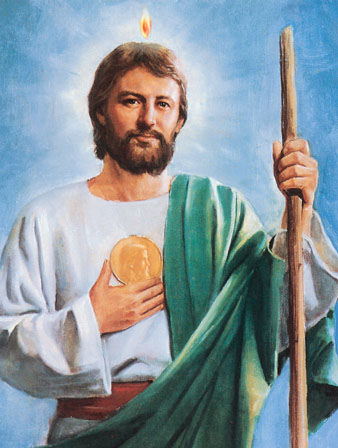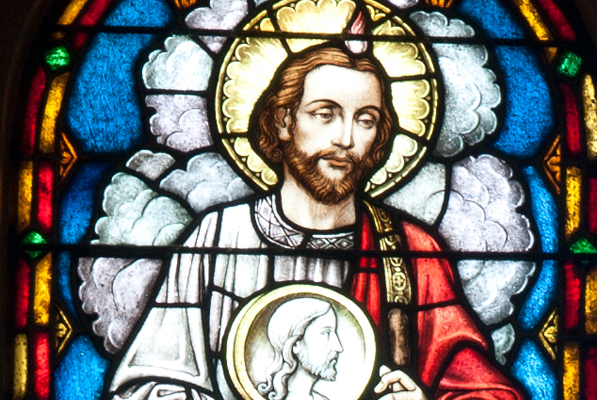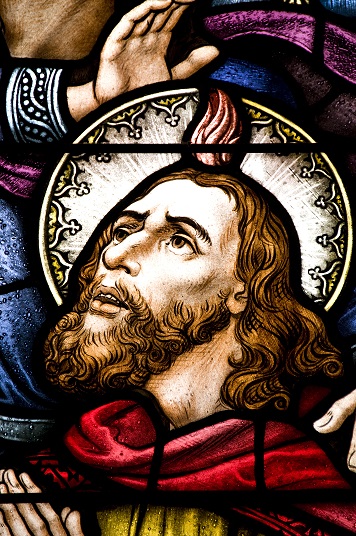St. Jude Thaddeus: Patron Saint of Hope
By Fr. John M. Lozano, C.M.F.

St. Jude—one of the Twelve Apostles—is a mysterious figure in many ways. He moves in and out of the Gospel story as a quiet background figure—almost as if he were deliberately seeking to submerge his own personality in that of Christ rather than draw any attention to himself.
As a cousin of Jesus, Jude must have been born and raised very near the Lord. They both lived in or about Nazareth (Mark 6:3). Although we do not know which of them was born first, they must have been about the same age. Jesus grew in wisdom, stature, and favor with God and His people (Luke 2:52). His humanity unfolded in the inner light that led him to an immense love and respect for his heavenly Father. Jude must have been a witness to this perfectly human growth of Jesus.
Disciple and Friend of Jesus
When Jesus was about 30 years old and ready for His public ministry, He went off to Judea and was baptized by John. Shortly afterward He returned to Galilee to begin His itinerant ministry. He proclaimed the coming of the reign of God—God’s decisive intervention in human history to save all people—and called people to conversion in order to receive God’s gracious offer. It was a liberating message which stressed, in a way quite different from John’s fiery preaching, the revelation of God’s mercy. Jesus declared the forgiveness of sins and healed multitudes of sick people. Truly the grace of God was becoming visible in their midst.
Jesus soon began looking for fellow workers in this task of proclaiming God’s love. Jude became one of His disciples. From this time on, Jude was before all else Jesus’ disciple. Jude learned a great deal from Jesus about the mercy and providence of the heavenly Father, about generosity, about love of neighbor, and especially about love for sinners, the outcast, and the sick. With Jesus, he traveled the dusty roads of Galilee and the surrounding country. This was his period of formation for the apostleship.
Jude now became, more deeply than ever before, a friend of Jesus. Mark tells us that Jesus called the Twelve Apostles “that they might be with Him” (Mark 3:14). There was a deep bond of communion between Jesus and these men who shared His work and His weariness and looked forward with faith and hope toward the reign of divine grace. Mark says that on one occasion Jesus stated that His real family was made up of people like His disciples—the men and women who were doing God’s will—who accepted His message that the Father wills to save us (Mark 3:3435). Jude had moved on from being a relative of Jesus according to the flesh and had become His brother in the Spirit.
The Letter of Jude
Among the New Testament writing inspired by the Holy Spirit to be the nourishment and norm of our faith is a letter attributed to “Jude, a servant of Jesus Christ and brother of James.” It is addressed to “those who have been called by God; who have found love in God the Father, and have been guarded safely in Jesus Christ”—in other words, to all Christians (Jude 1:1). In the Bible, this letter is the next-to-last book in the New Testament and comes directly after all the other Epistles and before the book of Revelation. It is a short book, consisting of a single chapter made up of 25 verses. Rather than an Epistle, it is really an exhortation to stand firm in the faith of Christ against those who would distort or deny that faith.

The letter goes on to call the faithful to lead a fully Christian life characterized by the following elements: 1) holding to the faith as the foundation of all, and 2) praying in the Spirit. Here Jude touches on something deeply felt in the first Christian communities and a matter on which Paul insisted: Prayer is always the work of the Spirit, who dwells in our hearts. Christians pray in the Spirit whenever they allow themselves to be shaped and led by the Spirit of the Lord. The Letter of Jude certainly reveals a great love of God and a tender devotion toward Jesus Christ our Lord.
Personal Devotion to a Saint
The heart of devotion to the saints is imitation. Merely to attempt to use the power of the saints to intercede for us without any change in our own lives is opposed to the whole idea of venerating the saints. One of the main reasons why the Church encourages devotion to the saints is that we may more closely imitate their virtues.
By recalling the life of St. Jude, we remember the faith and devotion to Christ he revealed in his untiring ministry and in his trials. Should we be put to the test or tempted, our devotion to St. Jude will give us strength and will quickly lead us to turn to him for assistance. There is every reason to believe that our prayer will be heard.

To give depth and breadth to our devotion to St. Jude, we must take time in the quiet of our heart to attempt to build up a real and living picture of the saint in our minds. He was a human being, first of all. He had the advantage of actual companionship with Christ, but this did not make him less human. And we, too, are privileged to have a real companionship with Jesus ourselves in faith, prayer, the celebration of the Eucharist, and in the service of the poor and the suffering, with whom Jesus identifies himself.
In addition, Jude’s long years of trial and dedication followed the Ascension of our Lord, when the Saint of Hope was living in the midst of a society often more openly secular than our own. The temptations he faced were not paper temptations that he miraculously overcame.
This means that especially during a novena to a particular saint—during the nine days of special prayers and devotions in which we seek a special favor through the saint’s intercession of our Lord—we must make a special effort to imitate the saint’s outstanding virtues. A novena is not just a quick means of attempting to gain a particular favor; it is a period of special devotion to a saint and a time set aside to attempt to make the saint’s major virtues a part of our own spiritual life through practice. Viewed in this light, novenas can play an important part in our spiritual development.
Modern Devotion to St. Jude
The first important manifestation of widespread public veneration of St. Jude in the western hemisphere took place in 1911 in Chile. There the Claretian Missionaries, founded by St. Anthony Claret in Spain less than a century before, built a large shrine to the Apostle, a shrine which still attracts many petitioners even today. And from this shrine in Chile, devotion has spread to all the South American countries.
In the United States, a shrine to St. Jude also was established by the Claretian Missionaries in Chicago in 1929. This is the National Shrine of St. Jude, and was the first major shrine dedicated to him in this country.
Once again the apostolic zeal of St. Jude is being felt in the world 20 centuries later. He is many things to many people. Not only those in great need of hope or with desperate causes find solace and strength through his intercession on their behalf with our Lord. He is also a patron for all those in the 21st century who are attempting to imitate his commitment and energy in preaching the word of God under difficult circumstances. He is equally a patron of missionaries in difficult fields and of lay people trying to teach by their word and their lives in a secular society. And to all, he is a model of Christ’s disciples.
As a friend of our Redeemer, he is our friend. And if we desire the friendship of Christ, we shall find St. Jude an eager intercessor, anxious to help prepare us for a closer union with our Savior, a union of will which will begin here on earth and find its ultimate fulfillment in eternity. St. Jude, pray for us!

